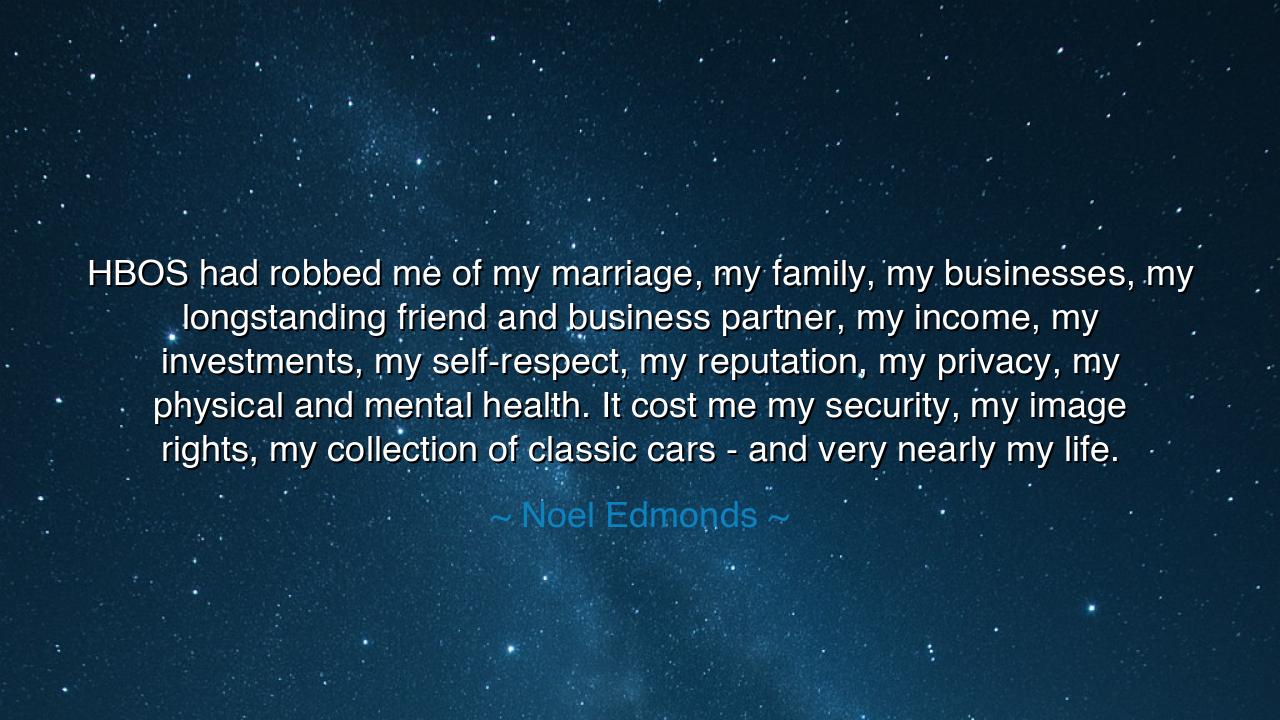
HBOS had robbed me of my marriage, my family, my businesses, my
HBOS had robbed me of my marriage, my family, my businesses, my longstanding friend and business partner, my income, my investments, my self-respect, my reputation, my privacy, my physical and mental health. It cost me my security, my image rights, my collection of classic cars - and very nearly my life.






In the anguished words of Noel Edmonds, we hear the cry of a man who has walked through the fire and emerged scarred but unbroken: “HBOS had robbed me of my marriage, my family, my businesses, my longstanding friend and business partner, my income, my investments, my self-respect, my reputation, my privacy, my physical and mental health. It cost me my security, my image rights, my collection of classic cars—and very nearly my life.” These are not the words of a man seeking pity, but of one who bears witness to the devastating power of betrayal and loss, and the long shadow that greed and corruption cast over the lives of the innocent.
The origin of this quote lies in a true and tragic chapter of modern commerce—the collapse of the HBOS Reading scandal, a banking catastrophe in which deceitful financiers destroyed the livelihoods of countless individuals for personal gain. Edmonds, once a symbol of optimism and joy to millions, became one of its many victims. His businesses were sabotaged, his fortune stolen, his trust shattered. In his lament, he lays bare not only his personal ruin, but the deeper sickness of a world where the pursuit of wealth can devour the very souls of men. His words echo with ancient resonance, for this story, though modern in name, is as old as civilization itself.
For have not the ancients told us that greed is a serpent that consumes its own tail? In every age, there have been men who mistook power for purpose and gold for glory, forgetting that the wealth of a man lies not in possessions but in integrity. When the powerful exploit the weak, the earth itself trembles. The gods of old punished hubris with ruin, and even now, though the temples have changed, the law of balance remains. Edmonds’ suffering is not his alone—it is the voice of every soul wronged by systems that place profit above humanity, reminding us that corruption, though cunning, cannot conquer truth forever.
Consider the tale of Job, the righteous man of scripture, who lost all that he loved—his family, his wealth, his health—through forces beyond his control. Yet though he sat in ashes and despair, he did not let the darkness extinguish his light. Edmonds’ journey mirrors this same ancient struggle: the test of endurance, the battle for self-respect when all else has been stripped away. In the depth of his suffering, he rediscovered the only thing that cannot be taken—the spirit’s will to rise again. And from that fire was forged wisdom greater than gold: the understanding that what defines a person is not what they lose, but what they refuse to surrender.
In his confession, we also hear a warning. The loss of mental and physical health, the erosion of self-respect, and the collapse of trust are not merely personal tragedies—they are signs of a civilization out of balance. When the systems that govern wealth are driven by deceit, when those entrusted with power act without conscience, then even the strong may falter. Yet in the ruins of despair, Edmonds’ story becomes a call to restore moral order, to demand integrity where greed has reigned, and to remember that institutions are only as human as those who shape them.
But beyond the politics of banking and business, there lies a deeper, spiritual lesson. Life, though cruel at times, offers every soul the chance to rebuild from dust. The man who has lost everything has also lost fear; he stands naked before truth, and in that nakedness lies a strange kind of freedom. Edmonds’ survival—his refusal to end his life when despair nearly consumed him—reveals the quiet heroism that dwells within the human heart. It is the courage of those who, like phoenixes, rise from their own ashes and learn to live again, not in the shadow of their loss, but in the light of their endurance.
Thus, let his story be a parable for all generations: guard not only your wealth, but your soul; trust not merely in systems, but in the strength of character and compassion. When life robs you of what you hold dear, remember that no thief can steal your spirit unless you yield it. In times of injustice, stand firm in truth. In moments of despair, remember your worth. For as Edmonds’ words remind us, though the world may take everything from a person, the light within—the courage to live, to love, and to believe again—remains the one treasure that can never be stolen.
So, dear listener, if ever you find yourself stripped bare by betrayal or loss, do not surrender to the darkness. Rise, as Edmonds did, and declare that though the world may break your fortune, it cannot break your will. For the health of the body may fail, and possessions may vanish, but the dignity of the spirit endures—and from that flame, a new life may yet be born.






AAdministratorAdministrator
Welcome, honored guests. Please leave a comment, we will respond soon